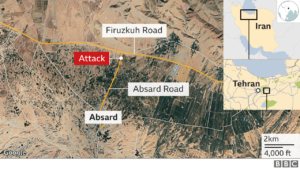Iran has vowed to avenge the killing of its most senior nuclear scientist, Mohsen Fakhrizadeh, who was assassinated near Tehran on Friday.
Fakhrizadeh died in hospital after an attack in Absard, in Damavand county.
Hossein Dehghan, military advisor to Supreme Leader Ayatollah Ali Khamenei vowed to “strike” the perpetrators like thunder.
Western intelligence agencies believe Fakhrizadeh was behind a covert Iranian nuclear weapons programme.
Iran insists its nuclear programme is for peaceful purposes.
The country’s Foreign Minister Mohammad Javad Zarif, called on the international community to “condemn this act of state terror”.
“Terrorists murdered an eminent Iranian scientist today,” he said in a tweet.
Iran’s UN ambassador Majid Takht Ravanchi said the killing was a clear violation of international law, designed to wreak havoc in the region.
Mr Zarif blamed Israel for the attack saying it had “serious indications of Israeli role”.

Fakhrizadeh’s name was specifically mentioned in Israeli PM Benjamin Netanyahu’s presentation about Iran’s nuclear programme in April 2018.
There has been no comment from Israel on the news of the assassination.
Commander of the Islamic Revolutionary Guard Corps, Maj Gen Hossein Salami, said the “assassination of nuclear scientists is the most obvious violation of the global hegemony to prevent our access to modern sciences”.
News of the killing comes amid fresh concern about the increased amount of enriched uranium that the country is producing. Enriched uranium is a vital component for both civil nuclear power generation and military nuclear weapons.
A 2015 deal with six world powers had placed limits on its production, but since President Donald Trump abandoned the deal in 2018, Iran has been deliberately reneging on its agreements.
Joe Biden has pledged to reengage with Iran when he becomes US president in January, despite longstanding opposition from Israel.
Former head of the US Central Intelligence Agency (CIA), John Brennan, said the killing of the scientist was a “criminal” and “highly reckless” act that risks inflaming conflict in the region.
In a series of tweets, he said Fakhrizadeh’s death “risks lethal retaliation and a new round of regional conflict”.
Mr Brennan added that he did not know “whether a foreign government authorised or carried out the murder of Fakhrizadeh”.
bbc.com